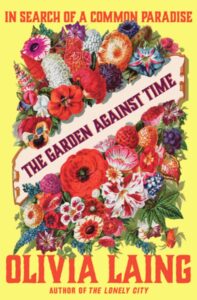October 7, 2024
The Garden Against Time, by Olivia Laing
“How strange time is. The same patterns keep recurring, a helical sequence of war and sickness, from out of which emerged the same green-veined dream.”
For a book that’s about her own backyard, Olivia Laing’s THE GARDEN AGAINST TIME: IN SEARCH OF A COMMON PARADISE takes her reader everywhere and back through time as she tells the story of her restoration of an 18th century walled garden begun when she and her partner move to Suffolk in 2020, a year that becomes “that year.” As she moves through her own plague seasons, she draws connections to gardens in the minds of Milton (PARADISE LOST) and rural poet John Clare, changes and trends in English landscaping ( a word that, she tells us, began with art and paintings), of how the mid-Atlantic slave-trade was the foundation of so much wealth that shaped the English landscape (I am also reading Tanya Talaga’s THE KNOWING, from which I learn that those very same investors were reaping the rewards of the North American fur trades that would decimate the continent’s Indigenous peoples), and how gardens have also been at the forefront of movements committed to imagining better ways of organizing society, which seems especially pressing to consider in the sweltering summer of 2022 as parts of the UK burned and watering her garden, Laing thought, seemed like an irresponsible indulgence. And how new life took root in the brutal bomb sites of London after the Blitz, so many of these sites turned into parks, and she casts her mind too back to Mark Rumary, the famed UK garden designer who’d once owned her home (and lived with his partner back when, a neighbour tells her, “it wasn’t good to be gay”) and whose vision is everywhere in the garden still, Laing reflecting on her own childhood growing up with a gay parent in the 1980s, and what the garden must have meant to both of them as place of freedom and belonging. And there’s so much more than that, every single page bringing fascinating rewards and gorgeous insight, doses of hard reality coupled with vision and hope. The garden is never simply this or that, instead the garden is a place for both, and, and for the remarkable persistence of living things (gardeners among them).






